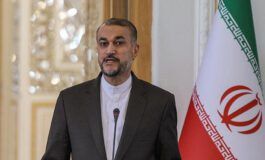WASHINGTON – Leading up to a critical set of meetings here between top U.S. and Israeli officials, a new survey found little backing among the Israeli public for a military strike against Iranian nuclear facilities without Washington’s approval.
According to the poll, released at a briefing at the Brookings Institution here Wednesday, only about one in five Israelis (19 percent) favor a unilateral strike without U.S. support.

|
| The poll found that 34 percent of the 500 Israeli respondents questioned by the pollsters oppose a strike and that a similar percentage believes such a strike would either have no effect on Iran’s nuclear program (19 percent) or actually accelerate it (11 percent). |
If, on the other hand, Washington gave a green light for an attack, another 42 percent of Israelis would favour it, according to the survey, which was conducted late last week by Israel’s Dahaf Institute and has a margin or error of four percent.
The poll, which was organized by Shibley Telhami, a senior fellow at Brookings who teaches Middle East politics at the University of Maryland, found that 34 percent of the 500 Israeli respondents questioned by the pollsters oppose a strike and that a similar percentage believes such a strike would either have no effect on Iran’s nuclear program (19 percent) or actually accelerate it (11 percent).
The poll, which also found that more than two-thirds of respondents (68 percent) believe that such an attack will provoke retaliation by Lebanon’s Hizbullah, is likely to bolster those in the administration of President Barack Obama who hope to persuade Prime Minister Benjamin Netanyahu when the two men meet here next week to shelve any plans his security cabinet may have for carrying out such an attack this year.
Netanyahu will be here to speak before the annual convention of the powerful American Israel Public Affairs Committee (AIPAC), which has been the main domestic lobbying force pushing for a hawkish policy and Congressional passage of a series of ever-tougher sanctions against economic and financial sanctions against Iran.
Obama, as well as Israeli President Shimon Peres and a host of other political heavyweights from both countries and major U.S. parties, is also scheduled to speak to the convention before his meeting with Netanyahu.
The Obama-Netanyahu meeting will cap a flurry of bilateral meetings of senior officials in both countries’ capitals over the last month in what appears to be an effort to gauge each others’ intentions.
Israeli Defense Minister Ehud Barak, widely considered the most hawkish member of Netanyahu’s eight-man security cabinet, is here this week, while Obama’s national security adviser, Tom Donilon, was in Israel last week. The head of Israel’s Mossad, its foreign intelligence agency, was here to meet with his counterparts here, shortly after the chairman of the U.S. Joint Chiefs of Staff, Gen. Martin Dempsey, completed a two-day visit to Israel.
While officials on both sides publicly insist that that they are coordinating their policies, the frequency of these high-level meetings, as well as off-the-record comments by anonymous officials, suggest that key differences on tactics and strategy in dealing with Iran may in fact be widening.
Top administration officials, backed by a growing number of retired military and intelligence officials here, have made increasingly clear that they oppose an Israeli military strike.
Echoing both his predecessor, Adm. Michael Mullen, and his boss, Pentagon chief Leon Panetta, Dempsey warned in an interview 10 days ago in the clearest expression of the administration’s position to date that such an attack would be, among other things, “destabilizing”, “premature”, “not prudent”, and unlikely to achieve Israel’s “long-term objectives”.
U.S. military and intelligence officials have also stated repeatedly that they do not believe the Iranian leadership has yet decided to build a nuclear weapon.
Such remarks have infuriated Netanyahu who, according to Israeli reports, accused Dempsey of “serving Iranian interests” by reducing the credibility of the threat that Israel or the U.S. would resort to military action if Tehran did not abandon its nuclear program. He also reportedly refused to promise Donilon that he would give Washington advance notice if he decided to mount an attack.
Netanyahu himself reportedly hopes to persuade Obama to take a tougher line against Iran, beyond the administration’s mantra that “all options are on the table,” a reference to possible military action.
In particular, he wants Washington to publicly establish a clear “red line” – specifically, the achievement by Iran of an ill-defined nuclear-weapons “capability” – which, if crossed by Tehran, would trigger a U.S. attack.
The administration, however, has so far declined to do so, insisting privately instead that its red line would be Iran’s actual “weaponization”, a benchmark that most analysts believe would take at least three years for Iran to achieve if it indeed decided to produce a deliverable bomb.
And while its officials, including Dempsey, continue to emphatically insist that the military option remains on the table, many analysts here – and in Israel – believe that the administration prefers putting in place a “containment and deterrence” strategy toward a nuclear Iran over a war whose consequences cannot be predicted.
Thus, AIPAC, presumably with Netanyahu’s encouragement and support, is lobbying for a pending Senate resolution that would take the “containment” option from the table and declare that it is a “vital national interest” of the U.S. to prevent Iran from acquiring a “nuclear weapons capability”.
“We …want to say clearly and resolutely to Iran: You have only two choices – peacefully negotiate to end your nuclear weapons program or expect a military strike to end that program,” said Sen. Joseph Lieberman, one of the co-sponsors.
Two other co-sponsors, John McCain and Lindsay Graham, met with Netanyahu in Israel last week, while three of the four remaining Republican presidential candidates are expected to endorse it when they address AIPAC next week.
The resolution so far has 37 co-sponsors, roughly equally divided between Republicans and Democrats, in the 100-seat Senate, but AIPAC is expected to make an all-out push for passage when its 10,000 activists arrive in Washington this weekend.
In this context, the latest poll should strengthen Obama’s hand. In addition to the lack of support for a unilateral strike that isn’t approved by Washington, it also found that a large majority of Israelis – and especially Israeli Jews – believe that Hizbullah, which is believed to have tens of thousands of rockets targeted on Israel, would join Iran in retaliating against any attack on Tehran.
On the other hand, a 44-percent plurality of Israeli respondents said they believed that an Israeli attack could set back Iran’s nuclear program by at least three years.
Asked what they expected the U.S. to do if Israel carried out an attack, 27 percent said they thought Washington would join the war on Israel’s behalf, while 39 percent said it would provide diplomatic support but not military assistance. Only 15 percent said Washington would punish Israel by reducing its assistance.
Respondents were equally split on whether an Israeli attack would weaken or strengthen the Iranian regime, and a slight majority said a military strike against Iran would trigger a military conflict lasting months or years, as opposed to days or weeks.
Israeli respondents were split on whether they preferred Obama to former Massachusetts governor Mitt Romney in November’s presidential elections, but preferred Obama by large margins over the other Republican candidates, including former Pennsylvania Sen. Rick Santorum and House Speaker Newt Gingrich who have been the strongest advocates of military action against Iran.
-Jim Lobe’s blog on U.S. foreign policy can be read at http://www.lobelog.com.





Leave a Reply